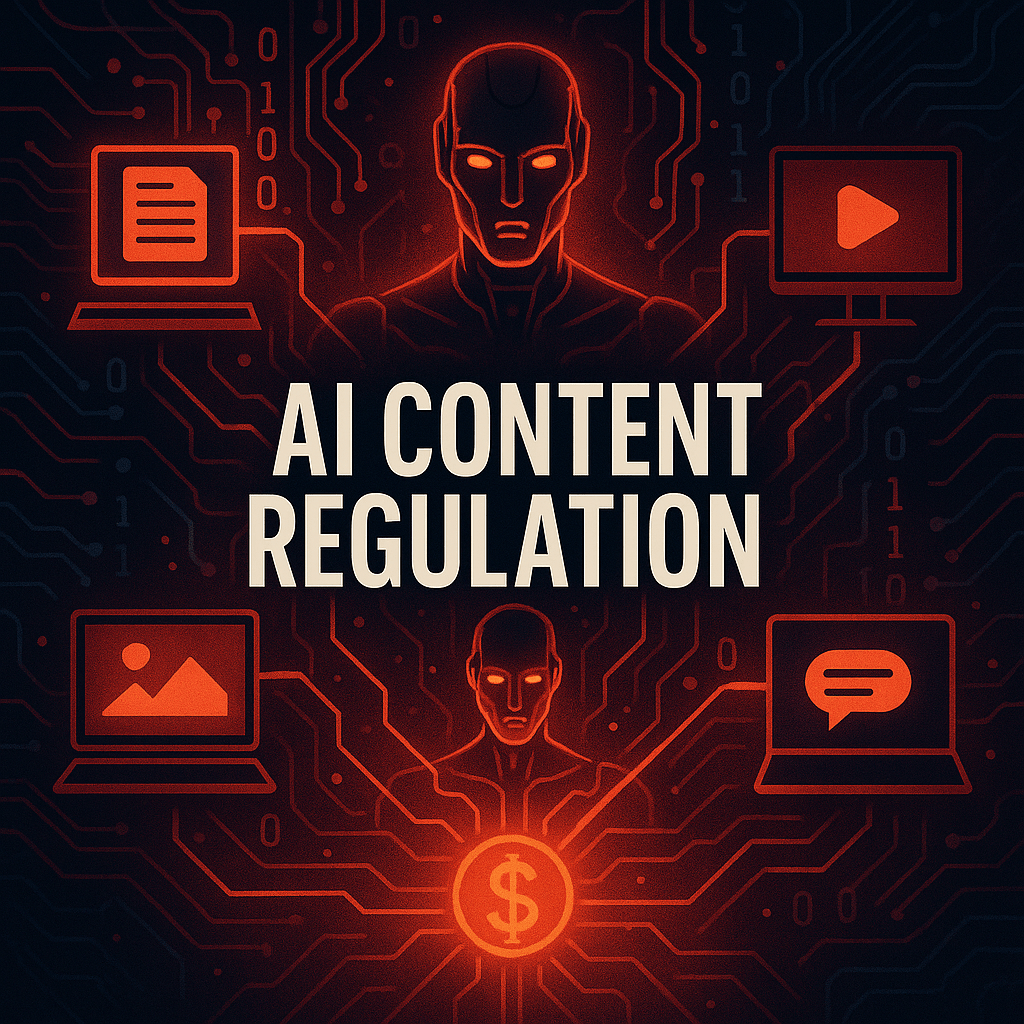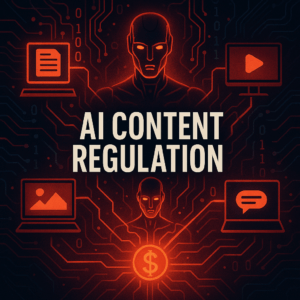Artificial intelligence has revolutionized content creation, enabling everything from synthetic video to real-time deepfake avatars and AI-written articles. But this explosion of AI-generated content has triggered legal responses from governments, platforms, and courts worldwide. For entrepreneurs and technology startup founders relying on or building generative AI tools, understanding the legal landscape of AI content regulation is now essential.
This blog outlines the major legal frameworks, risks, and compliance strategies startups must consider to avoid liability and position themselves competitively in the age of AI.
What Is AI Content Regulation?
AI content regulation refers to emerging legal rules and standards governing the production, distribution, and liability for content created or enhanced by artificial intelligence. This includes:
- Synthetic media disclosure laws (e.g., deepfakes)
- Copyright rules for generative models
- Platform-specific moderation mandates
- Data usage restrictions for training sets
In California and federally in the U.S., AI content regulation is still evolving but increasingly shaped by sectors like elections, healthcare, consumer protection, and intellectual property.
Is AI-Generated Content Protected by Copyright?
The U.S. Copyright Office has taken the position that purely AI-generated works, without human authorship, are not entitled to copyright protection. See Zarya of the Dawn (2023).
However, if a human exercises meaningful creative control over the output (e.g., selecting prompts, editing results), courts may recognize a “thin” layer of copyright. For startups, this raises two critical issues:
- Can you enforce IP rights on your AI outputs?
- Can others sue you for using their protected works to train or generate content?
What Are the Liability Risks for Startups?
Tech startups using AI for content creation or dissemination face increasing risk under:
- False advertising claims under the Lanham Act (if AI-generated testimonials mislead consumers)
- Right of publicity violations (e.g., deepfake videos using celebrity likenesses)
- Section 230 erosion: While internet platforms traditionally enjoy broad immunity for third-party content, startups that generate or curate AI content may be seen as co-creators and lose this protection.
- Product liability theories, especially when AI content harms public health, investor decisions, or safety.
 Which States Have AI Disclosure Laws?
Which States Have AI Disclosure Laws?
Several U.S. states have passed or are considering legislation requiring disclosure of AI-generated content, especially during election seasons:
- California: SB 1047 requires safety disclosures from developers of frontier models.
- Texas: Prohibits deepfake use in political advertising.
- New York: Proposed bills mandate watermarking and attribution.
Technology Startups and Entrepreneurs distributing AI-generated content must monitor these developments carefully, especially if their content reaches users in those jurisdictions.
How Can Startups Comply With AI Content Laws?
Startups can mitigate legal risks by implementing compliance strategies such as:
- Clear AI-use disclosures in generated content
- Training dataset documentation and licensing
- Internal review systems for misleading or unsafe outputs
- Privacy-by-design and opt-out mechanisms
Founders should also consider engaging legal counsel for:
- Drafting AI-specific terms of service and disclaimers
- Reviewing prompt engineering policies
- Developing incident response plans for content-based claims
How AI Content Regulation Affects Fundraising and M&A
Investors and acquirers are increasingly scrutinizing legal exposure from AI tools. Startups unable to prove compliance with emerging content regulations may see reduced valuations or stalled transactions.
Due diligence may now include:
- Source of training data
- Watermarking and moderation tools
- Internal AI use policies
- Pending regulatory investigations
Best Lawyers For Navigating AI Content Regulation
AI content regulation will only grow more complex in 2025 and beyond. Tech founders and their counsel must treat this not as a niche risk but as a core pillar of product design, investor readiness, and corporate governance.
For legal counsel and strategic guidance on building a compliant and defensible AI business, schedule your confidential consultation now by visiting techandmedialaw.com or using our secure contact form.
David Nima Sharifi, Esq., founder of the L.A. Tech and Media Law Firm, is a nationally recognized IP and technology attorney with decades of experience in M&A transactions, startup structuring, and high-stakes intellectual property protection, focused on digital assets and tech innovation. Quoted in the Wall Street Journal and recognized among the Top 30 New Media and E-Commerce Attorneys by the Los Angeles Business Journal, David regularly advises founders, investors, and acquirers on the legal infrastructure of innovation.
Schedule your confidential consultation now by visiting L.A. Tech and Media Law Firm or using our secure contact form.



